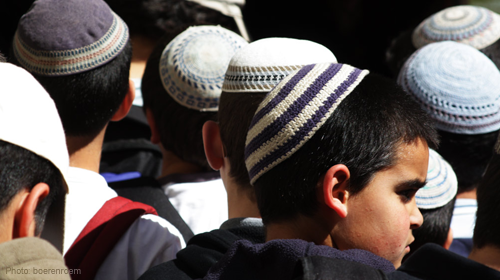
The Wyoming Department of Corrections (WDOC) prohibits Jewish prisoners in Wyoming from wearing a kippah (also known as a yarmulke) anywhere other than in their own cells or during religious services. Today, the ACLU and the ACLU of Wyoming sent a letter to the WDOC on behalf of an Orthodox Jewish prisoner, Clarence E. Fisher, whose religious beliefs require him to wear his kippah at all times. By prohibiting prisoners from wearing religious headgear outside of their cells and religious services, the WDOC forces Fisher and other prisoners to violate their core religious beliefs, and that violates the law.
Being incarcerated involves the loss of many freedoms, but many people don't realize just how much a person's liberty is restricted. Most prisoners cannot choose what clothes they wear, or control when and what they eat, or associate freely with other prisoners. A prison sentence and the need to manage prisoners in the prison environment is not a license to deny them fundamental religious rights. How can a Catholic prisoner abstain from meat on Fridays if that is the only food available? How can a Muslim prisoner fast during Ramadan if the prison refuses to give her breakfast before sunrise? How can a Sikh prisoner maintain his unshorn hair and beard if prison regulations require short hair and a shaved face?
This particular vulnerability of people in prison is the very reason Congress passed the Religious Land Use and Institutionalized Persons Act (RLUIPA) in 2000. RLUIPA requires any substantial burden on a prisoner's religious exercise to be the "least restrictive means" of serving the government's compelling interest. This doesn't just mean that the requirements of the law itself have to be as permissive as possible—it also means that there has to be a very good reason why the prison won't allow exceptions for individual prisoners.
The WDOC cited generic "security concerns" for its refusal to grant Mr. Fisher's request to wear a kippah in accordance with his religious beliefs, but have offered no evidence, as required by RLUIPA, to support their claim. In fact, when prisoners are outside, they can wear baseball caps and hats purchased at the prison commissary. What kind of contraband could be hidden in a kippah but not a baseball cap?
Nor did prison officials explain why other, less restrictive measures (e.g., subjecting kippahs to searches) could not address any real security concerns that may be associated with religious headdress. Many prisons across the country, including those governed by the Federal Bureau of Prisons, allow prisoners to wear kippahs at all times and throughout the facilities without problems. Are the security concerns at the WDOC so unique that they cannot adopt similar policies?
Prison may involve a loss of freedom, but it does not require prisoners to surrender all of their rights. Without evidence of a specific security concern, Fisher and other prisoners should be allowed to follow their religious beliefs. The ACLU asked the WDOC to revise its policies accordingly, and we hope we get the right answer.
Learn more about religious discrimination and other civil liberty issues: Sign up for breaking news alerts, follow us on Twitter, and like us on Facebook.

